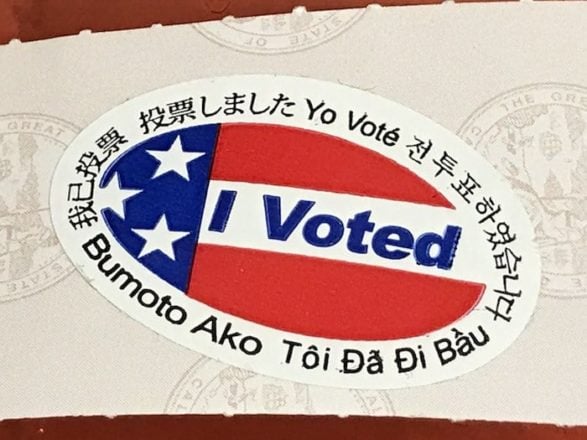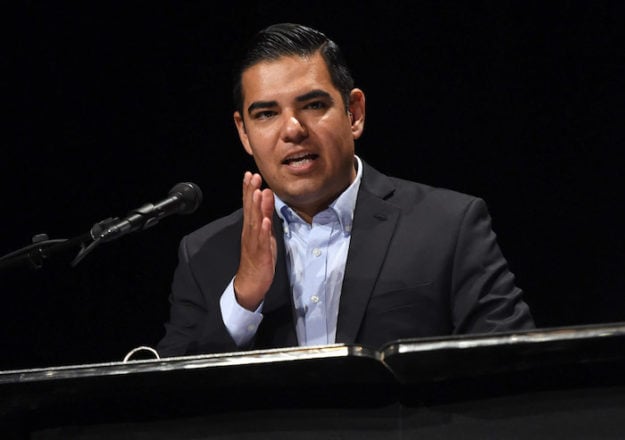
Long Beach city officials and Measure M supporters won’t call it a tax, but that’s what it is — a tax. Taxes are necessary to pay for public services, but in this case, it’s a money grab. Photo: Q Voice News.
LONG BEACH — According to the glossy, well-financed campaign paraphernalia littering our mailboxes, Armageddon will fall on Long Beach, and the city may have to cut basic public services, like police and fire, if voters don’t approve the Measure M tax in Tuesday’s State Primary Election.
City officials and Measure M supporters won’t call it a tax, but that’s what it is — a tax. Taxes are necessary to pay for public services, but in this case, it’s a money grab.
In essence, Measure M would allow the city to raid money from the water department for use in the general fund AND then make consumers pay for it by raising utility rates. By the way, the city had been doing this and was caught and sued. Oops. Maybe that’s why they are not sharing that info with the public. Very sneaky.
Numerous offices and seats are up for grabs, and several measures also are on the ballot. Not sure where to vote? Click here to find your polling place.
As for Measure M, don’t be fooled. The supports’ claims are just scare tactics designed to misinform the public, as usual.

Supporters of Long Beach’s Measure M, including Long Beach Mayor Robert Garcia, have not been transparent with the public or shared vital information on the tax. Photo: Q Voice News.
MEASURE M HISTORY
Let’s give some history on why, in March, the Long Beach City Council approved putting Measure M on the ballot. The measure’s cheerleaders (city council members, Mayor Robert Garcia, Los Angeles County Supervisor Janice Hahn) are not being transparent or sharing vital information with the public to make an informed decision. We think you should know.
For years, Long Beach has charged its own water department millions of dollars in “fees” for the right to use city pipelines.
In the past decade, the water department has paid about $91 million in “pipeline permit fees” to the city, according to city figures. The city also has taken that money and transferred it into the general fund, which is used for basic city services like, parks, libraries, police, and fire, as well as employee salaries and pensions.
However, the city has taken no accountability of the money and doesn’t know how it was spent. Oops. That’s embarrassing.
At the same time, the city hiked water rates on consumers in recent years to make them pay the “permit fees” the city charged itself.
CITY SUED
In 2016, resident Diana Lejins sued the city, saying the city violated Proposition 218, which was approved by voters in 1996. That law requires that local governments get voter approval before imposing special taxes, including utility rate hikes.
While cities are allowed to recover operating costs of a city-owned utility, the law prohibits municipalities from taking money collected from utility services and using it to pay for other general public services. For example, when the city took those “permit fees” and transferred the money to the general fund, it became a tax and required voter approval.
If revenue is meant to be used to pay the general costs of government, it’s a tax.
If revenue is designated to pay a specific government program or service, it’s a fee.
CITY PLAYS VICTIM
Instead of going to trial, the city settled the lawsuit in late 2017. Under the agreement, the city stopped charging the pipeline fees and will return $12 million from the general fund to the water department over four years. The first annual payment of $3 million began in February. With the money being returned to the water department, consumers were expected to see their monthly bills drop.
The city also had become addicted to the taxes from the water department and then began playing victim. As a result of the lawsuit, the general fund would face an estimated $7 million annual deficit. Got that? The city blames the whistleblower for exposing its questionable behavior.
ENTER MEASURE M
The city then had an ingenious idea — Measure M. It would amend the city charter and allow it to transfer money from the water department to the general fund and raise utility rates to pay for it — the exact, possibly illegal, behavior it had been confronted with in the lawsuit.
Wonder why that information isn’t shared with the public in those campaign flyers?
